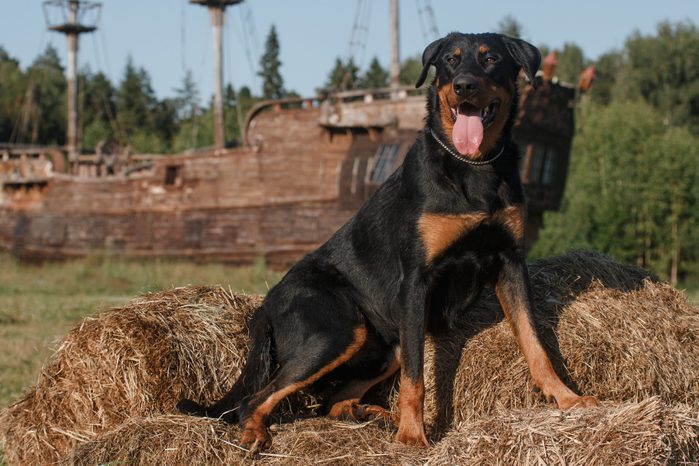
Guard dogs: Born to protect
Dogs have been protecting their humans at least since the days of Plato and Aristotle. Our needs for security, companionship, and loyalty haven’t changed much since then, making dogs a popular choice for protection of our loved ones and our property.
Watchdogs will bark or otherwise alert their people to perceived intruders but usually won’t attack. Guard dogs have a protective instinct for their families, honed over hundreds of years, says Gina DiNardo, executive secretary at the American Kennel Club (AKC), and they will bite or otherwise defend against threats. The best guard dog breeds display fearlessness and also look the part, with an intimidating size and appearance, perhaps even belonging to one of the giant dog breeds. They may also rank among the smartest or most loyal breeds.
If you’re seeking a dog for protection, the same rules of dog ownership still apply. You’ll want to give this dog the love and affection you would give any pet, and never, ever keep it chained up or locked in a basement or yard. Even the fiercest dog breeds are still vulnerable living beings who rely on humans for everything, including food, shelter, and trusted companionship. Here are some great examples of protective pooches who will be the loving, watchful eyes and ears in your home.
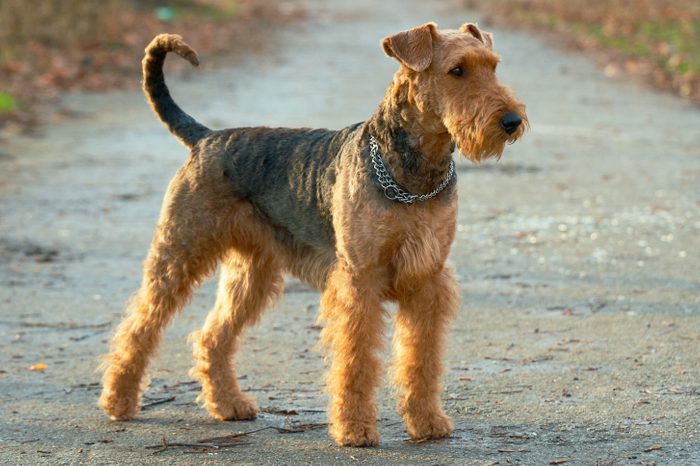
Airedale terrier
The “king of terriers,” the Airedale is friendly and exuberant—sometimes seeming to have no “off” switch, according to VetStreet.com. But Airedales are great with kids, quick learners, and generally thought to be hypoallergenic, too, making them one of the best guard dogs for families. During World War I, the breed earned a reputation for bravery and focus, thanks to the dogs’ roles as sentries and couriers, notes the AKC. If they sense a threat, Airedales will bark relentlessly and will put their powerful jaws to use if necessary, but they’re ready to love on anyone the family accepts. Airedales don’t like being alone, though, and if bored, can resort to chewing and digging. They also can be aggressive toward other animals, and even play a little too rough with their family, unless trained otherwise. With their bearded chin and folded-down ears, Airedales have won the Westminster Dog Show four times—although the last time was in 1933.
| Height: | 23 inches |
| Weight: | 50 to 70 pounds |
| Life expectancy: | 11 to 14 years |
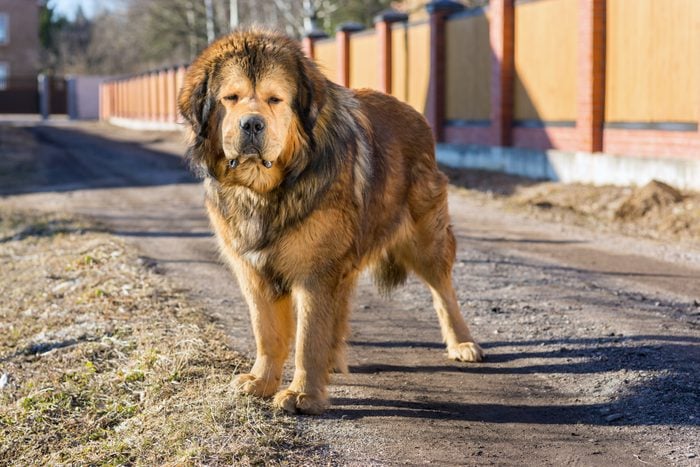
Tibetan mastiff
The Tibetan mastiff, bred in the Himalayas to guard people as well as livestock, is one of the best guard dogs around. Aloof, mentally sharp, watchful, and a little bit primitive, according to DiNardo, this massive breed is also strong-willed and very territorial. Be aware that if you keep a Tibetan mastiff in your home, it may not allow anyone else to visit. But it will have a mellow, sweet disposition with family members. The Tibetan mastiff is also one of the most expensive dog breeds.
| Height: | 24 to 30 inches |
| Weight: | 70 to 160 pounds |
| Life expectancy: | 10 to 12 years |
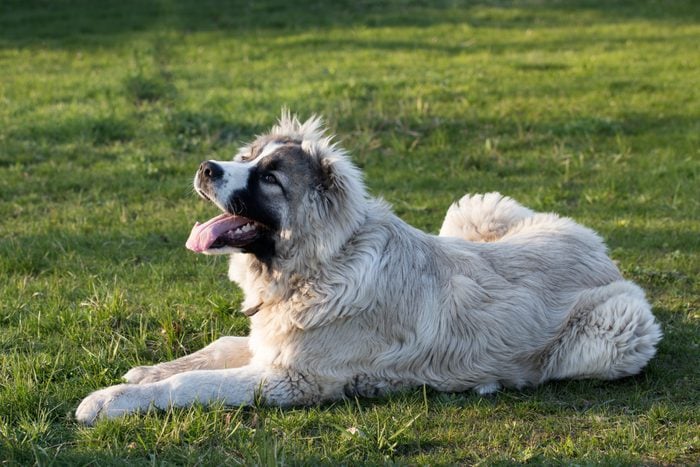
Caucasian shepherd
The Caucasian shepherd goes by many names, including Russian bear dog, Caucasian Ovcharka, Caucasian mountain dog, and Caucasian sheepdog. With a sweet-looking face that resembles a bear, this is one of the most popular Russian dog breeds today. Because they can be powerful and fierce, especially with strangers, Caucasian shepherds have a long if somewhat complicated history as guard dogs. Originating in the Caucasus Mountains, the breed was first used centuries ago to protect livestock and property, and to kill wolves and hunt bears. Later, the dogs were used to guard prisoners in Soviet Gulag camps and patrol the border at the Berlin Wall. With family, however, the Caucasian shepherd is said to be loyal, calm, and sweet, especially when it receives proper training. Its thick, water-resistant double coat comes in colors ranging from gray or white to yellow, red, and brindle, and may need daily brushing.
| Height: | 23 to 30 inches |
| Weight: | 100 to 170 pounds |
| Life expectancy: | 9 to 12 years |
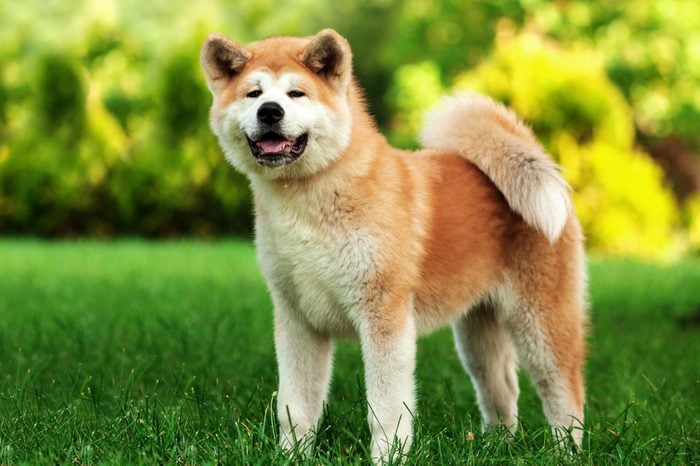
Akita
This stocky, curly-tailed Japanese mountain dog is revered in its native country as a symbol of good health and long life, according to the AKC. Akitas are fiercely protective by nature, and in the Middle Ages, they guarded the Japanese emperor and his family. Helen Keller was gifted an Akita during a trip to Japan in 1937, making her the first American to own one. Akitas are very social animals, and they can be playful and silly. Typically, they bark only when there’s a really good reason, says the Akita Rescue Society of America. Akitas can be aggressive with other dogs and need to be socialized early on to interact appropriately with them as well as with people.
| Height: | 24 to 28 inches |
| Weight: | 70 to 130 pounds |
| Life expectancy: | 10 to 14 years |
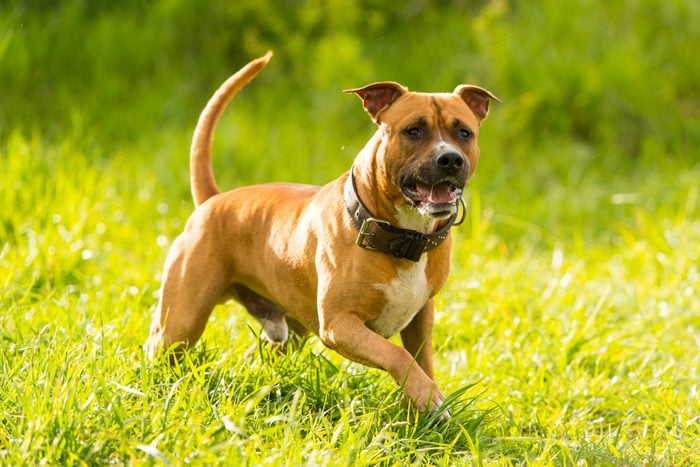
American Staffordshire terrier
The AmStaff, which is one of several types of pit-bull dogs, is affectionate, playful, and energetic. These dogs enjoy mental stimulation and have tons of personality, the AKC says. They also require a good deal of exercise, but can become overheated in warm weather and aren’t great swimmers. Weighing between 50 and 80 pounds when fully grown, AmStaffs are muscular and powerful, and have a reputation for being unruffled by pain. Because of the breed’s long history as a fighting dog and its natural drive to hunt prey, AmStaffs need proper training and socialization, especially if they live with children or other pets.
| Height: | 17 to 19 inches |
| Weight: | 40 to 70 pounds |
| Life expectancy: | 12 to 16 years |
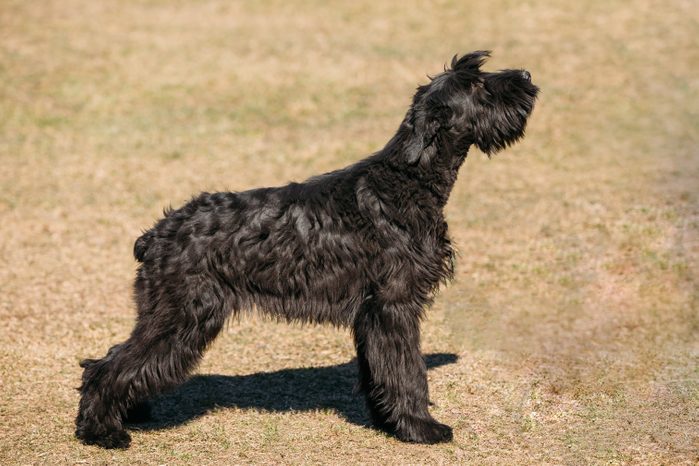
Giant schnauzer
This bearded behemoth lives to protect its family and home, according to the AKC. The breed has the size and strength to be good at it, and the added benefit of being resistant to pain, WagWalking.com notes. Bonus: It’s also hypoallergenic. Giant schnauzers like constant attention, however, and have an extremely high need for both mental and physical stimulation—they can become destructive when those needs aren’t met. They also tend to chase pets that are smaller than them (basically all other pets), so they do best when they’re the only animal in the home.
| Height: | 24 to 28 inches |
| Weight: | 55 to 85 pounds |
| Life expectancy: | 12 to 15 years |
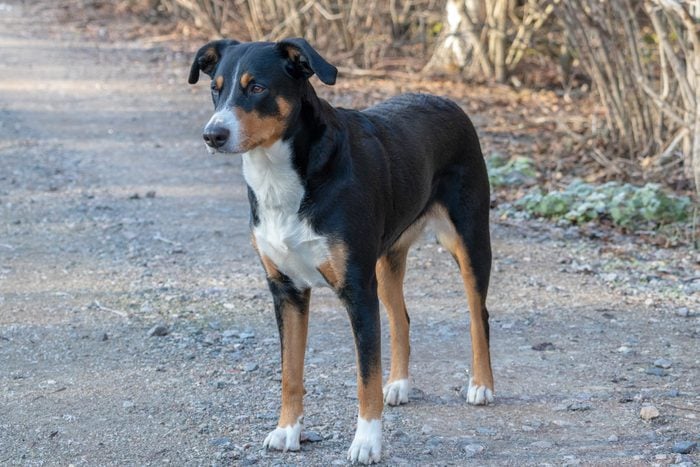
Appenzeller sennenhund
Hailing from Switzerland, these medium-sized mountain dogs are cheerful, smart, and energetic. Despite their mostly friendly demeanor, Appenzellers are naturally wary of strangers and are definitely not pushovers. They’re actually fearless, according to the AKC, and can’t be deterred from protecting their families even if a big juicy steak is in the offing as a distraction. Appenzellers do better in colder climates and need a lot of space, so apartment living is out. If this sounds like too much work for you, you’ll want to know the best low-maintenance dogs for busy people.
| Height: | 19 to 22 inches |
| Weight: | 50 to 70 pounds |
| Life expectancy: | 12 to 15 years |
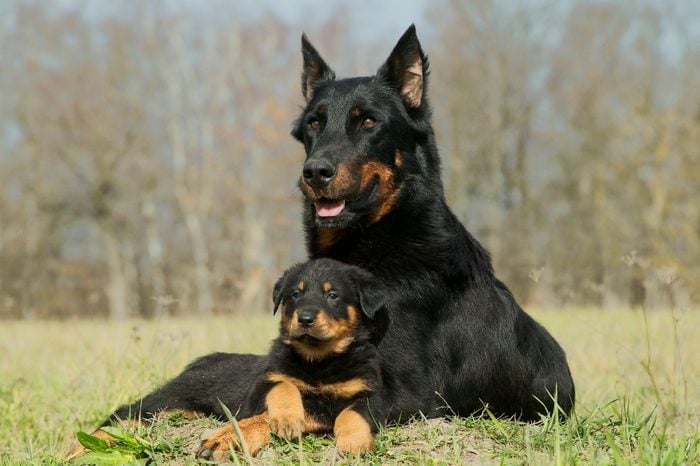
Beauceron
You might not know it by looking at them, but Beaucerons, which strongly resemble Doberman pinschers, are actually the largest of all the French sheepdogs, according to the American Beauceron Club. Fans of this giant dog breed claim that the dogs are sensitive and smart. With their calm demeanor and confident, fearless attitude, Beaucerons can be terrific guard dogs. They will require firm training, however, to prevent them from dominating their families.
| Height: | 24 to 28 inches |
| Weight: | 70 to 100 pounds |
| Life expectancy: | 10 to 12 years |
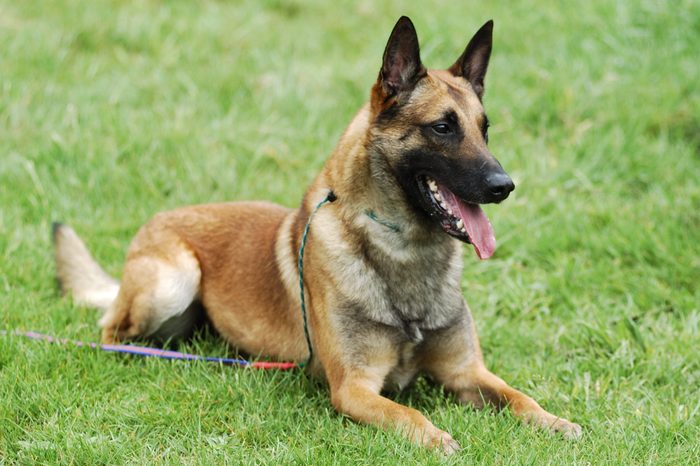
Belgian Malinois
Long used in police work, this dog breed achieved a moment of fame when one named Cairo helped Navy SEAL Team 6 take down Osama bin Laden in 2011. Another Belgian Malinois named Conan was honored in 2019 after the dog was injured during a raid on an ISIS leader in Iraq. Similar in appearance to the German shepherd, the Malinois is strong, intelligent, and loyal, making it a great choice for a guard dog. However, it can also be territorial and jealous, according to the American Belgian Malinois Club. For that reason, families should be prepared to commit a substantial amount of time to training.
| Height: | 22 to 26 inches |
| Weight: | 40 to 80 pounds |
| Life expectancy: | 14 to 16 years |
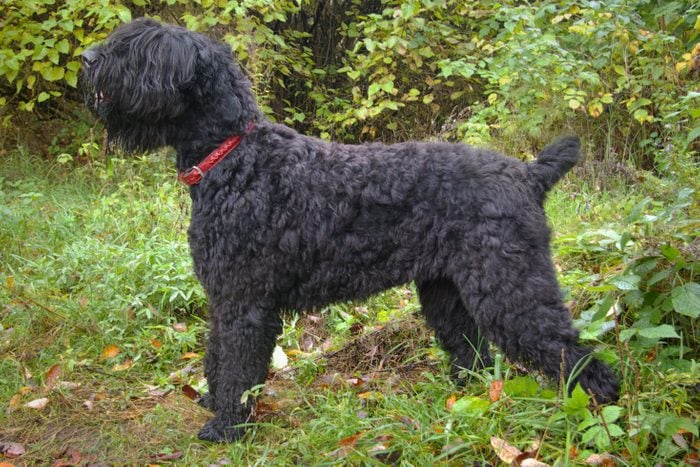
Black Russian terrier
This massive dog was bred as a kind of “superdog” for the Russian army in the 1930s, according to the AKC. A team of scientists used genes from 17 breeds to develop this friendly-looking but aloof and fiercely protective dog to patrol its borders. Weighing up to 140 pounds, and with a shock of shaggy black fur covering its eyes, nose, and mouth, a BRT could inadvertently knock over small children. They also need strong human leadership, or they may dominate some family members.
| Height: | 26 to 30 inches |
| Weight: | 80 to 130 pounds |
| Life expectancy: | 10 to 12 years |
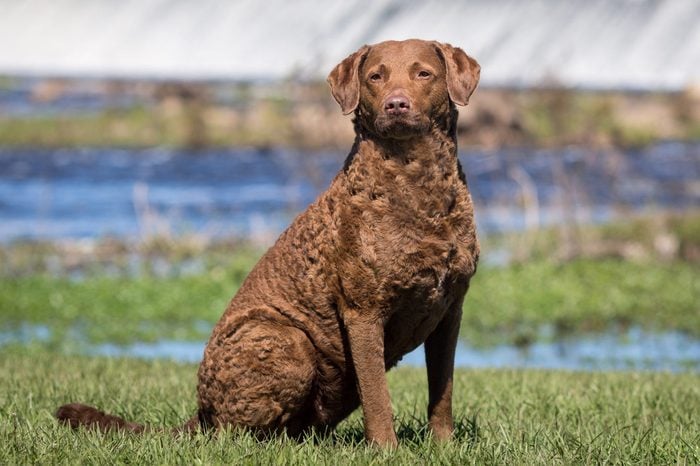
Chesapeake Bay retriever
The AKC’s DiNardo says this is the most naturally protective of the sporting dogs. Though it’s sensitive and devoted to family, a Chessie can be stubborn and is not nearly as effusive toward strangers as other retriever breeds. Bred to retrieve waterfowl, Chessies like to be active and, specifically, to hunt, so they’re not a good fit for sedentary families. Modern Dog magazine says this doggo will shed a lot, too, and its waterproof coat has a tendency to be a bit smelly.
| Height: | 21 to 26 inches |
| Weight: | 55 to 80 pounds |
| Life expectancy: | 10 to 13 years |
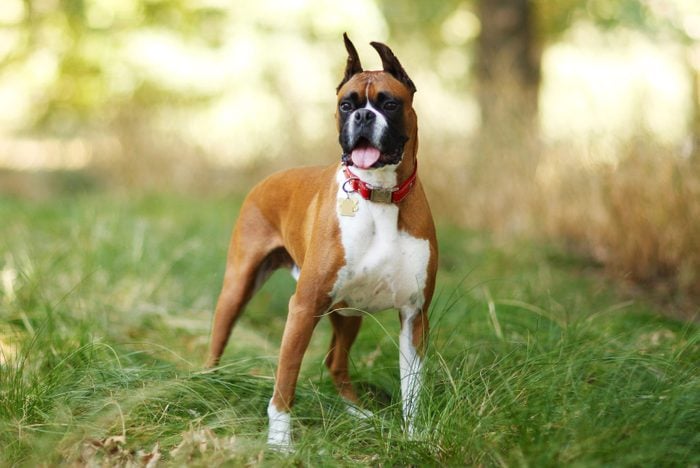
Boxer
A medium-sized dog, the boxer is affectionate, playful, patient, and all-around great with kids. These dogs may be brawny, athletic and look intimidating, but they’re not actually aggressive. With training, however, the brindle dog breed makes a great watchdog. They have high energy levels, though, and need frequent exercise. Boxers are also more prone to certain health conditions than other breeds, including mast cell tumors, ulcerative colitis, and heart disease, according to Petful.com.
| Height: | 22 to 25 inches |
| Weight: | 50 to 80 pounds |
| Life expectancy: | 10 to 12 years |
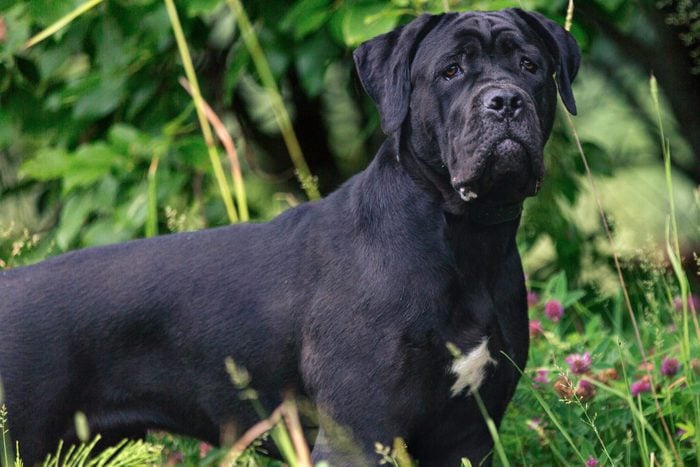
Cane Corso
This name, translated from Latin, means “bodyguard dog,” and it has been bred to be devoted to its family. Also known as an Italian Mastiff, the breed is enormous, often weighing more than 100 pounds. Its short, stiff coat lends to its imposing appearance and indeed, the dog can be aggressive with strangers. It’s said to be impervious to pain, as even electric fences won’t deter it, Petful.com notes. But with its family, the cane Corso is affectionate. For these reasons, it is one of the best guard dog breeds, though not for first-time dog owners. Training is imperative to prevent the cane Corso from “owning” its family.
| Height: | 24 to 28 inches |
| Weight: | 85 to 120 pounds |
| Life expectancy: | 9 to 12 years |
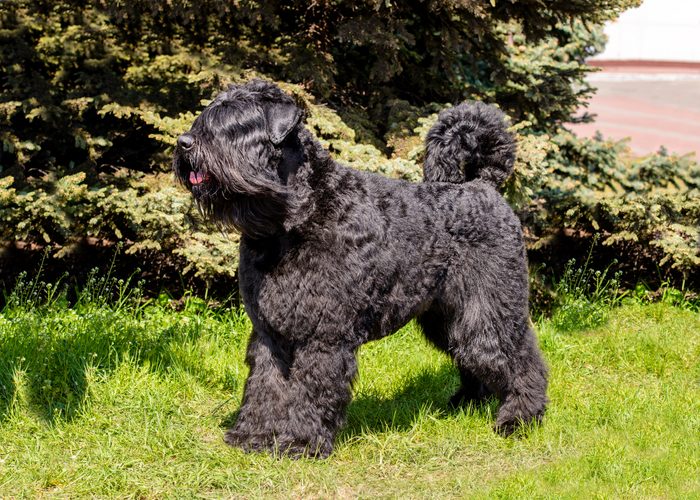
Bouvier des Flandres
Don’t let the friendly appearance and gentle demeanor of these fluffballs fool you. With muscular bodies that weigh up to 110 pounds, Bouviers are powerful and courageous, in addition to being super-smart. Thankfully, they’re also pretty laid back and loving when they’re just hanging out with the family, and will only become aggressive when a threat is imminent. They don’t shed a lot, making them a great choice for someone looking for a hypoallergenic guard dog, but their fur can trap dirt and their beards can drip water, Orvis cautions.
| Height: | 24 to 28 inches |
| Weight: | 70 to 110 pounds |
| Life expectancy: | 10 to 12 years |
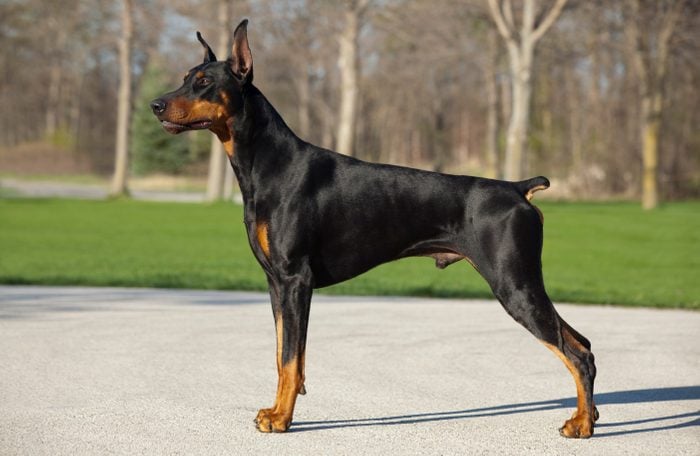
Doberman pinscher
One of the best guard dog breeds, the Doberman is a sleek, powerful, fearless, and fast dog. Considered the fifth-smartest dog breed in the world, it is loyal in protecting its people and always alert. Dobermans also bark a lot. If they need to, they will take a threat seriously, pinning an intruder against the wall or cornering it until humans take charge. When they’re off duty, Doberman can be big-time goofballs. They have high energy needs and make great running companions. Unfortunately, the breed is also prone to a host of health conditions, including spinal compression, blood-clotting problems, obesity, and skin issues, notes CertaPet.
| Height: | 24 to 28 inches |
| Weight: | 60 to 100 pounds |
| Life expectancy: | 10 to 12 years |
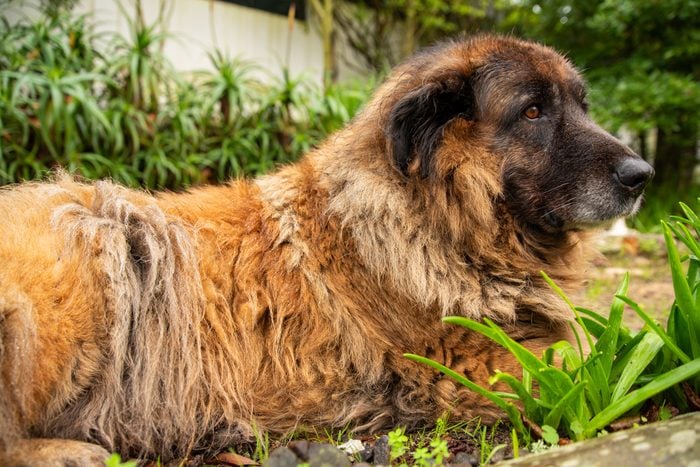
Estrela mountain dog
This dog is loving and devoted toward children and other family members, but it might choose one individual as its adored person. Intelligent and brave, it won’t hesitate to defend its people or their home, the AKC says. The Estrela is relatively calm in temperament, but definitely needs its space and daily walks. If it’s cooped up in tight surroundings, it might turn destructive. This big galumph of a dog—weighing up to 130 pounds—can be hard to find outside its home nation of Portugal.
| Height: | 24 to 29 inches |
| Weight: | 75 to 135 pounds |
| Life expectancy: | 10 to 14 years |
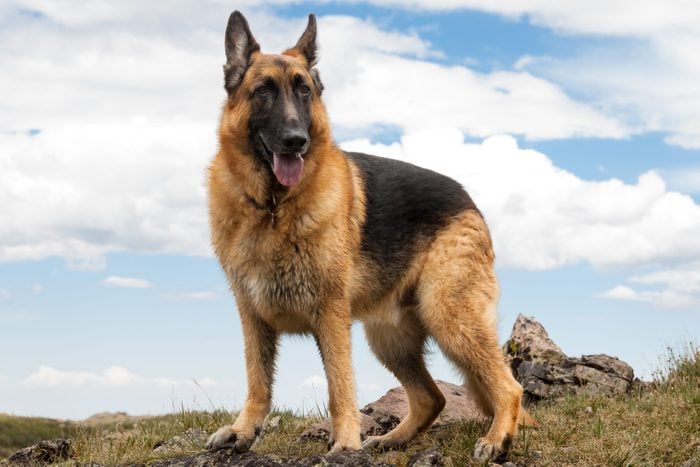
German shepherd dog
A classic choice because of his imposing stature and loud bark, this German dog breed is widely seen as one of the best guard dogs. Its loyalty and bravery know no bounds, and it is willing to risk its own life for that of its family, the AKC says. It is a natural learner and easy to train. Sometimes a German shepherd can take its job a little too seriously, though, and needs to be taught not to pounce on anyone who approaches you or the home. These dogs do shed a lot and like to have a job to do, so consider that before committing to one.
| Height: | 22 to 26 inches |
| Weight: | 50 to 90 pounds |
| Life expectancy: | 7 to 10 years |
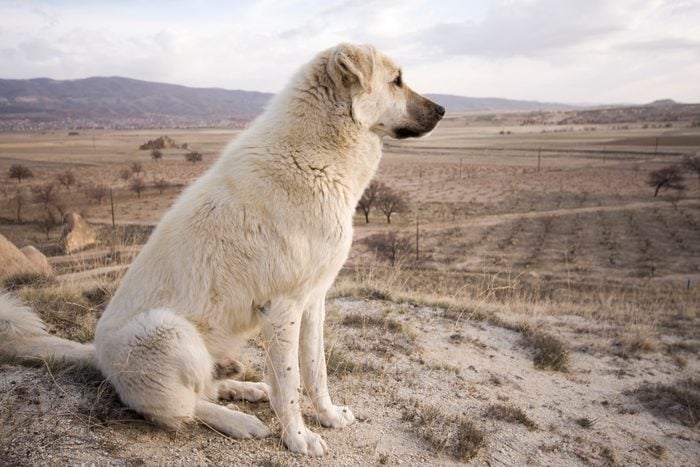
Anatolian shepherd
These extra-large dogs were bred more than 6,000 years ago to protect livestock, so they’re suspicious and watchful by nature. Given their size—up to 150 pounds—and their loud bark, they’re likely to deter any would-be interlopers. The downside is that they can be overly aggressive with visitors and unknown dogs. And because they are territorial, they need a fair amount of space to “patrol,” so apartment life isn’t for them. They are very loyal and protective of their families, but not necessarily obedient except with firm training.
| Height: | 27 to 29 inches |
| Weight: | 80 to 150 pounds |
| Life expectancy: | 11 to 13 years |
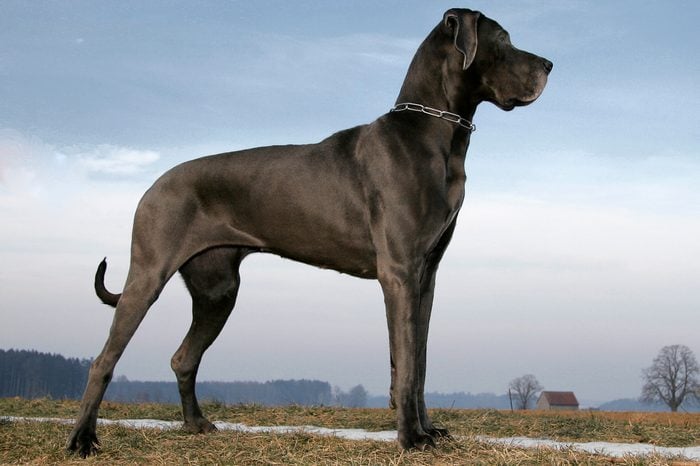
Great Dane
This is the Scooby-Doo breed. Unlike the clumsy Scoob, however, real-life Great Danes are graceful despite their incredible height of about 30 inches, CanineBible.com reports. They’re also courageous and have a deep, scary-sounding bark—not at all like Shaggy’s best friend. It’s this bark, combined with their intimidating size, that makes Great Danes a good choice for a watchdog. However, just like the cartoon dog, they have affectionate, gentle personalities, and probably won’t actually bite an intruder. Great Danes are also playful and patient with kids. They tend to have shorter lives—usually about six to ten years—and are prone to heart, bone, and gastrointestinal conditions.
| Height: | 28 to 32 inches |
| Weight: | 110 to 175 pounds |
| Life expectancy: | 7 to 10 years |
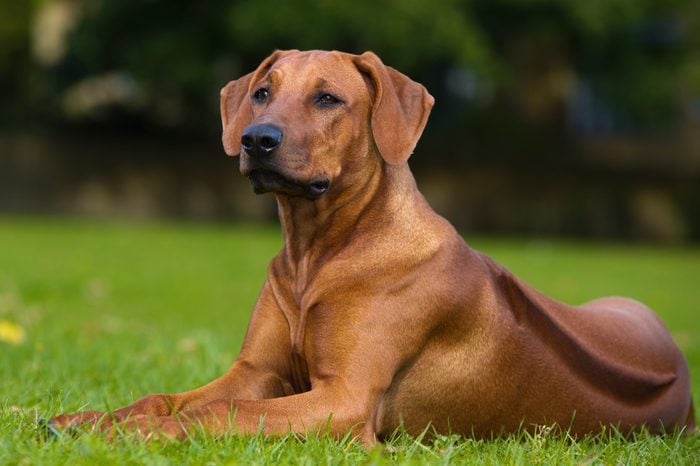
Rhodesian ridgeback
This breed’s name comes from the distinctive ridge of fur that grows in the opposite direction of the rest of the dog’s coat and stands up along its spine. The AKC notes that this watchful dog was originally bred to help hunt lions, so standing up to suburban threats is no big deal. They can be stubborn and domineering, and like all other guard dogs, need to be trained. Among family, ridgebacks are affectionate, patient, friendly, and loyal—but definitely need to be taught how to interact with children.
| Height: | 24 to 27 inches |
| Weight: | 70 to 85 pounds |
| Life expectancy: | 12 to 15 years |
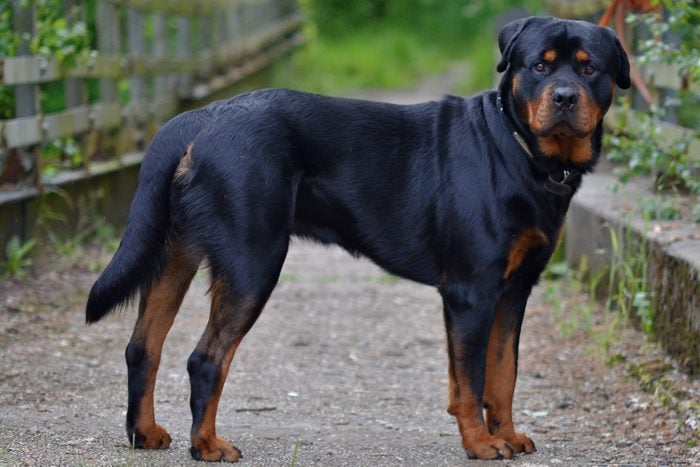
Rottweiler
Rotties, as they are known to their fans, can be sweet and playful with their families, and are very protective of them. To outsiders, rottweilers may appear aloof, the AKC says. The breed is actually descended from ancient mastiffs and almost went extinct in the late 1800s. A bit smaller than their mastiff cousins, coming in at an average of about 100 pounds when fully grown, Rotties can still play the intimidation card—and back it up with their bite. Because they can inflict severe injury, it’s imperative that rottweilers be socialized and trained early on so they understand when it is and is not OK to act aggressively. Training can also help prevent their barking from becoming a nuisance.
| Height: | 22 to 27 inches |
| Weight: | 80 to 135 pounds |
| Life expectancy: | 9 to 10 years |
Next, check out these dogs that look just like wolves.
